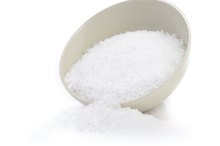Potassium Salt Substitutes
Cutting back on salt can be difficult when you've grown accustomed to its taste. Potassium-based salt substitutes are one option available to replace sodium added to foods by the salt shaker. Excessive potassium consumption can be dangerous so it's important to know all of the facts before dropping a salt substitute into your grocery cart.
Benefits of Potassium Salt Substitutes
Increasing the amount of potassium you consume can lower blood pressure and subsequently decrease the risk of stroke, according to the British Medical Journal. Potassium salt substitutes can provide beneficial amounts of the mineral to your diet. For patients with heart disease, increasing potassium may reduce the risk of irregular heartbeats and heart failure. Another benefit to potassium salt substitutes is the reduction of sodium added to foods. Extra dietary sodium in individuals with salt sensitivity can increase blood pressure. Lastly, potassium salt substitutes may offer the salty taste many people crave without the added sodium. Although, according to Consumer Reports, some consider the taste of potassium salt substitutes to be bitter.
Types of Potassium Salt Substitutes
What Are the Health Benefits of Morton's Salt Substitute?
Learn More
The Cleveland Clinic identifies various types of salt substitutes available to consumers. "Lite" or "low-sodium" products contain a mixture of potassium and sodium. Common brands include Morton Lite Salt Mixture and Diamond Crystal Salt Sense. "Sodium free" products are often 100 percent potassium chloride and replace all sodium added to your food from the salt shaker. Common brand names include "Nu-Salt" and "No Salt," which are described as tasting metallic by Consumer Reports. Alternatively, spices and herb products such as "Mrs. Dash" contain no sodium or potassium.
Dangers of Potassium Salt Substitutes
Kidney disease can make increasing potassium intake lethal. The Cleveland Clinic has indicated diseased kidney's cannot excrete potassium which may lead to a condition called hyperkalemia, or high blood potassium. Hyperkalemia can be deadly. Medication interactions with potassium salt substitutes can be dangerous to the body. Prescription medication for certain heart conditions, including diuretics and blood thinners, can interact with the potassium in the substitute causing heart failure and sudden death. Over-the-counter medications, including ibuprophen and aspirin, may also lead to dangerous reactions.
Recommendations
Can I Have Salt Substitute if I Have High Blood Pressure?
Learn More
Decreasing your intake of sodium is a healthy recommendation for everyone. Columbia University recommends speaking with a physician prior to changing to a potassium salt substitute, especially when pre-existing medical conditions are involved. Ideally, a gradual decrease in your intake of salt, by incorporating herbs and spices into foods, is best for your body. Just as the taste for salt is acquired, as is the taste for the actual food item minus the added salt. Take it slowly and eventually you won't even miss that salty taste.
Related Articles
References
Writer Bio
Based in Maryland, Angela Lang has been a freelance writer since 2010. She has been a registered dietitian since 1998 and is an avid nutrition educator in areas including diabetes, cancer and weight loss. Lang's interests include healthy eating to reduce obesity and disease. She holds a Master of Science in human resource development from Towson University.








